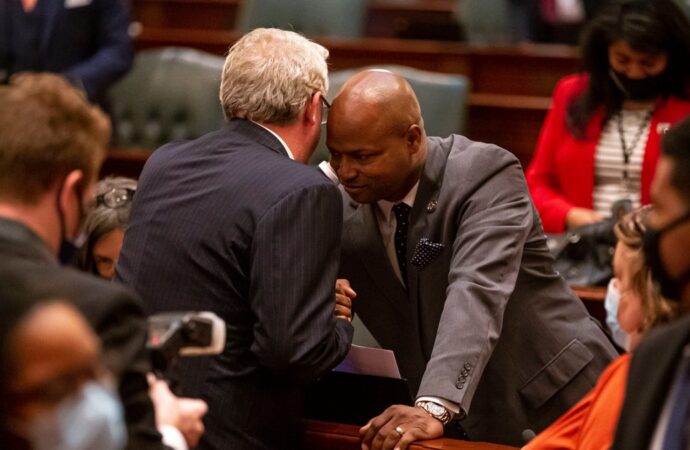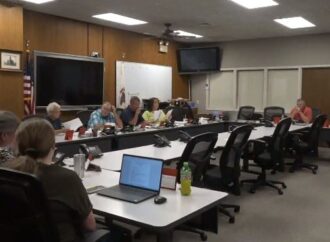A “new day” of cooperation and collaboration between Democrats and Republicans promised by Illinois House Speaker Emanuel “Chris” Welch in January has begun. Or it hasn’t. It all depends on whom you ask in the chamber or in the governor’s office. After the General Assembly’s spring session concluded last week, Democrats who hold super-majorities in
A “new day” of cooperation and collaboration between Democrats and Republicans promised by Illinois House Speaker Emanuel “Chris” Welch in January has begun. Or it hasn’t.
It all depends on whom you ask in the chamber or in the governor’s office.
After the General Assembly’s spring session concluded last week, Democrats who hold super-majorities in the House and Senate say they succeeded, for the most part, in carrying out a legislative agenda focused on children, working people, racial and ethnic equity and ethics reform.
They said they did it all in the middle of a worldwide pandemic that limited in-person meetings and contributed to an end-of-session frenzy of activity, and the new House speaker believes a new day has dawned.
“I think it’s gone quite well,” said Welch, D-Hillside, who was chosen by House members in January after longtime Speaker Michael Madigan, D-Chicago, suspended his campaign for another two-year term.
“We wouldn’t have accomplished the monumental things that we accomplished without collaboration and partnership,” Welch said. “This is a session we can be proud of.”
More: Pritzker defends new Illinois budget pushed through by Dems with $1 billion in projects
Republican complaints about budget, remap negotiations
Republicans, on the other hand, were able to work with Democrats on some issues. But on the big ones — such as the budget — Republicans said decisions reached were as partisan as ever and maybe even more so this year.
They noted that Democrats included money for a $1,200 legislative pay raise Republicans didn’t want in a more than 3,000-page budget bill filed a day or less day before it passed the House and Senate with no Republican votes.
“That was classic Mike Madigan, classic 65th and Pulaski style,” House Minority Leader Jim Durkin, R-Western Springs, said, referring to the street address of Madigan’s 13th Ward office in Chicago, where he remains the committeeman.
Earlier: Cannabis legislation to diversify industry approved by Illinois Senate, heads to Pritzker
Republicans said they were left out of final negotiations on the budget, and they disagreed with the way Democrats handled the drawing of new legislative and Illinois Supreme Court maps.
They said the sun heralding a new day in Springfield hasn’t begun to peek above the horizon. The result for everyday citizens, they said, has been overspending, massive pension debt, a less-than-favorable business climate and taxes that are higher than necessary.
“At the end of the day, it’s the same process we’ve seen for years,” said Rep. Tim Butler, R-Springfield.
“These massive pieces of legislation get dropped at the last minute, in the waning hours of session,” he said. “It’s not a very good way to have productive public policy when we have bills that are thousands of pages that no one really has the opportunity to review before they’re voted on.”
Democrats hold a 73-45 majority in the House and a 41-18 majority in the Senate.
“When the Democrats have such an advantage in the legislature with the super-majority, they really don’t care to engage the Republicans a whole lot because they can just do it themselves with their own votes,” Butler said.
“In politics, unfortunately, rhetoric and promises are one thing, and the way people conduct themselves while in office seems to be often a different thing,” he said.
Democrats move ahead with their agenda
Democrats, sometimes on a bipartisan basis, spearheaded a litany of bills now headed to the desk of Gov. JB Pritzker, a Democrat. Democrats say the legislation would enact a balanced budget, pay down debts, expand affordable housing, provide more families subsidies for child care, reduce the state’s backlog of bills and make the full, scheduled pension payment.
Democrats said legislation they passed to enact the $42.3 billion state budget, an essentially flat spending plan for the fiscal year to begin July 1, also would set more money aside for educating public school students, expand Medicaid services, boost social services and help businesses harmed by the COVID-19 pandemic.
Another bill would create more economic opportunity for women and minorities in Illinois’ legal cannabis industry, Democrats said.
The Medicaid expansion to cover more health services received wide bipartisan support. And Republicans contributed some votes to the cannabis legislation, which gives more latitude for existing dispensaries to relocate and attempts to give people from low-income, high-crime neighborhoods more opportunity to win state-awarded cannabis licenses.
Welch, 50, the state’s first Black speaker, succeeded the 79-year-old Madigan after Madigan presided over the House for all but two years between 1983 and 2021.
Welch said the House passed a “responsible, balanced budget” and “moved our state … a little bit closer toward racial and gender equity, led by the most diverse leadership team this body has ever had.”
Welch pushes for collaboration
Welch said he isn’t being critical of Madigan, one of his political mentors, when he said he has been more accessible to Republican and Democratic members of the chamber than Madigan was.
“I believe in a more collaborative approach,” Welch said. “I believe in democracy. I believe in giving people a voice in this process, and I think if you ask around on both sides of the aisle, they will tell you they had plenty of opportunity to shape what happened here in this last session.”
But Butler said Welch, like Madigan, spent little time on the House floor, while Durkin spent much more of his days there.
“We didn’t see a lot of the speaker, which is straight out of Madigan’s playbook,” Butler said. “He stays in his office all day long and posts stuff on social media, but we rarely see him on the floor. … This business is about relationships, and if the speaker is not around to continue to build relationships, then it makes it difficult to be productive.”
Welch said Butler’s criticism isn’t fair.
“My days started very early, and they ended very late,” he said. “Being speaker of the House means you’re basically the CEO of the chamber. It takes a lot of work, a lot of time, very intense, and so when I’m on the floor, it’s for a specific purpose. But when I’m not on the floor, I’m doing the work of the House, keeping the trains on the tracks. And so I think that no matter who is the speaker, you’re not going to find them on the floor very much just because of the nature of the job and responsibilities that it entails.”
Rep. Dan Brady, R-Bloomington, who has served in the House since 2001, said he had hopes for more collaboration with Democrats, but by the middle of the session, “the process was noticeably more rocky, noticeably more partisan.”
Lawmakers having to discuss issues and meet so often on Zoom rather than face to face and rarely spend free time together may have contributed to the situation, Brady said.
Sen. Steve McClure, R-Springfield, said: “This is the most partisan spring session I’ve experienced. I’ve only been here for three sessions, but out of the three, this was the most partisan.”
Arguments on the remap process
Welch pushed aside Republican criticisms regarding the state budget and map-making, a process that must take place at least once every 10 years.
Though Republicans disagreed, Welch said lawmakers had a “constitutional mandate” to complete legislative maps by June 30.
Not meeting that deadline, the speaker said, would have thrown the process to a bipartisan commission that likely would have deadocked, triggering the drawing of a name out of a hat that would have given Republicans a 50-50 chance of being able to enact their own map.
Pritzker signed the map into law Friday. It’s expected to be challenged in court before all members of the General Assembly are up for election in 2022.
Welch defended the Democrats’ use of American Community Survey estimates of population for the map, rather than decennial Census results, because the results aren’t expected until mid-August.
He and Pritzker faulted Republicans for not coming up with their own map proposal. Republicans said ACS data, the only information available, would be inaccurate, and they continued to call for creation of an independent map-drawing commission that both Welch and Pritzker supported in the past.
Read this: U.S. Congressman Rodney Davis puts pressure on Gov. JB Pritzker to veto legislative maps
The two men said an amendment to the state constitution would be required to create the commission, and though they supported an amendment, the legislature never agreed to put one on the ballot. And the men didn’t support Republicans’ plan to create a commission through existing constitutional provisions or through a new law.
Regarding the budget, Welch said the end-of-session finalizing of details for the budget was unavoidable. He disagreed with calling the budget a “last-minute” endeavor, saying Republicans are pushing a “false narrative.”
The budget bill was filed the night before votes were taken May 31 in the House. The Senate passed the bill early on June 1.
Welch said lawmakers “had plenty of time to go through it, and that was at the culmination of weeks and months of negotiations of what would go in there.”
Republicans said they weren’t a real partner with Democrats on the budget. Welch pushed back.
“We offered them an opportunity to be a partner in everything,” he said. “They chose what they wanted to be a part of. They helped us with ethics. We got ethics done. They helped us with cannabis. We got cannabis done. They helped us with affordable housing. We got affordable housing done. They helped us with Medicaid. We got Medicaid done.
“They pushed away from the table on the budget. They pushed away from the table on redistricting. They can’t pick and choose what they want to be a part of and then complain it’s the Democrats’ fault. They have to take some responsibility in their own decision-making.”
Ethics reforms considered a first step
Both Republicans and Democrats said they want to see even more ethics reforms passed beyond the bill headed to Pritzker’s desk. the bill would bar elected officials from lobbying other units of government and put some rules in place to interrupt the “revolving door” of lawmakers leaving and then returning to lobby the General Assembly.
Butler said the dysfunction Republicans continue to see in the legislature may slow progress toward further ethics reforms.
“We can continue to work on ethics and do it the right way over the summer, but I doubt that will happen,” he said. “The Illinois legislature seems incapable of doing it in a fashion that is collaborative and involves a lot of stakeholders when it comes to an issue like that.”
Colleague defends Welch
Rep. La Shawn Ford, D-Chicago, one of House Democrats’ budget negotiators, said he plans to work to give lawmakers and the public more time to sift through and evaluate future budget bills.
The current process “has to change,” he said, adding that many Democrats share Republicans’ frustration with voting on a final budget with 24 hours’ notice or less.
However, Ford said the public needs to consider Republicans’ motives when hearing their complaints about Welch.
“The Republicans probably would never recognize change unless there’s a change in party power,” Ford said.
He said Republicans should be happy that the budget contains many things they like, including preservation of the Invest In Kids tax credit for donors wanting to assist children with scholarships to private schools, a $350 million boost in the school aid formula, and more money for hospitals.
The final budget didn’t provide for eliminating all nine of the tax breaks that Pritzker wanted when he unveiled his budget proposal in February. The Invest in Kids credit was one of them.
Republicans spared from ‘tough votes’
Democrats were able to pass the budget without Republicans being forced to take “tough votes” on a budget that contained measures they didn’t like, Ford said.
Madigan sometimes would force overtime sessions to pressure Republicans to contribute votes to the Democratic majority on controversial bills, Ford said.
Ford also gave credit to Welch for allowing changes in House rules that give Republicans more input. Republicans don’t think enough has changed, but Ford said more progress will take time.
“The state cannot afford for Welch to come in and tear down everything in place,” Ford said. “This is an incremental change. … It was a successful run for Speaker Welch.”
Welch, Pritzker and other Democrats benefited from an unexpectedly swift upturn in the state’s economy and accompanying state tax revenues as COVID-19 cases declined and vaccines were deployed.
The state also will receive about $8.4 billion through the federal American Rescue Plan, with $1.5 million put to use in the fiscal 2022 budget, another $1 billion going toward capital projects in lawmakers’ districts, and almost $6 million yet to be appropriated.
Republicans complained that the $1 billion in projects apparently will be doled out by Democratic lawmakers. But Pritzker said the allocation of that money hasn’t been completed. Republicans can influence where the money goes by contacting Democratic lawmakers, he said.
Related: Pritzker budget plan keeps spending flat, closes $900 million in ‘corporate loopholes’
Final thoughts
Republicans said the state has more than enough money to preserve the nine corporate tax breaks and help companies fuel the economic recovery.
But the breaks that were eliminated in the budget bill will save $655 million annually and begin to chip away at the state’s long-term structural deficit, Pritzker said.
Through the bill, the governor said Democrats “acted responsibly when the Republicans wanted us to spend the one-time federal dollars to try to stick up for their benefactors, the wealthy corporations.”
Even though the General Assembly continues to negotiate a clean-energy bill affecting Chicago-based Exelon and utilities throughout the state, Pritzker and Welch said the session was successful.
News: Downstate lawmakers, unions, nonprofit utilities wary of ‘zero-carbon future’ legislation
“This is a testament to the fact that there’s a real effort here to put Illinois in a great position going forward,” Pritzker said.
Republicans, on the other hand, said Democratic control of state government will only perpetuate political scandals, and the redistricting fight was emblematic of what’s at stake.
Durkin said citizens “desperately want honesty in government.” Rep. Tom Demmer, R-Dixon, said Democrats’ No. 1 goal during the session was “gerrymandered” maps.
“Their true priority this year was to maintain their political advantage,” Demmer said. He said Democrats’ handling of redistricting was “a demonstration that we continue to govern through a system of brinkmanship. It’s inappropriate.”
Contact Dean Olsen: dolsen@gannett.com; (217) 836-1068; twitter.com/DeanOlsenSJR.

























Leave a Comment
Your email address will not be published. Required fields are marked with *